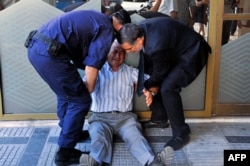It remains unclear whether Greeks will vote for more economic austerity to get crucial European bailout funds or reject EU demands and risk being thrown out of the eurozone.
Surveys going into Sunday's referendum showed the vote was too close to call.
Greek Prime Minister Alexis Tsipras urged voters to reject the conditions, which include more tax hikes and spending cuts. He said a "no" vote would give Greeks a better negotiating position with European Union finance ministers.
He and many Greek citizens said they had suffered enough from earlier EU demands that have cost them jobs and sharply lowered their standard of living.
Greek cabinet members and Syriza party officials met Tsipras in Athens Saturday afternoon.
Greek Finance Minister Yanis Varoufakis told the Spanish El Mundo newspaper that what the creditors were doing with Greece "has a name — terrorism." He said they wanted a "yes" vote on accepting more austerity measures "so they could humiliate the Greeks."
Varoufakis said he was sure an agreement with the creditors would be reached because "failing to agree would be too costly for both sides."
"If Greece crashes, a trillion Euros [the equivalent of Spain's gross domestic product] will be lost," he said. "It's too much money, and I don't believe Europe could allow it."
But those in the "yes" camp said Greece had no choice but a European future. Being forced out of the eurozone means Greece would have to go back to using the old currency, the drachma — money that some outside Greece could refuse to accept.
Austria's Finance Minister Hans Joerg Schelling said in an interview posted Saturday in online newspaper Die Presse that Europe would hardly suffer if Greece left the eurozone, but Greece would feel consequences.
"For Europe, this would be easy to manage economically. For Greece, it would indeed be considerably more dramatic," Schelling said, adding fears of widespread poverty sweeping Greece were overstated.
He said Greece would have to negotiate a new aid program, no matter the outcome of the referendum.
Finance Minister Wolfgang Schaeuble of Germany, Greece's biggest creditor, said in a newspaper interview that a Greek exit from the Eurozone might only be temporary.
The week leading up to Sunday's referendum was a miserable one for most Greeks.
Banks put strict limits on withdrawals to avoid running out of funds, although ATMs ran out of cash several times. Supermarkets were fast running out of basic foods. Storekeepers were reluctant to restock shelves because of the uncertainty of how they would be able to pay for the supplies.
Greece defaulted on a $1.8 billion loan payment to the International Monetary Fund on June 30 when European finance ministers refused to extend its economic bailout.
The Europeans accused Athens of refusing to make any more economic reforms, while the Greeks said they felt enslaved by their creditors.
Rallies on referendum
Tsipras said Friday a "no" vote would give Greece a chance to "live in dignity in Europe." He addressed a rally of 25,000 people supporting a "no" vote in central Athens, with one poster reading, "On July 5, We Are Writing History / No Vote."
"I'm not going to cry, I'm not going to be afraid, I'm going to say no!" Tsipras supporters chanted as they descended on Syntagma Square — the scene of anti-austerity riots in the past.
As the rally got under way, police threw stun grenades and clashed with protesters before the situation quickly calmed down.
Greek police said two people were detained.
A rival rally of a similar size who want a "yes" vote was held less than a kilometer away outside Panathenaic Stadium.
Protesters there shouted pro-European slogans and voiced fears of a so-called "Grexit" from the eurozone if voters reject more austerity measures.
Three recent polls of likely voters put the "yes" vote narrowly ahead. Analysts said this could be partly because of fears sparked by this week's money controls that closed banks and limited ATM withdrawals.
The poll of 1,000 people conducted by the ALCO company for To Ethos newspaper on June 30 and July 1 indicated 44.8 percent of respondents said they would vote "yes" while 43.4 percent would vote "no" and 11.8 percent were undecided.
Speaking to reporters Friday in Luxembourg, European Commission President Jean-Claude Juncker said that a "no" vote on Sunday meant Greece’s position would be “dramatically weakened.”
Some material for this report came from AP, AFP and Reuters.







